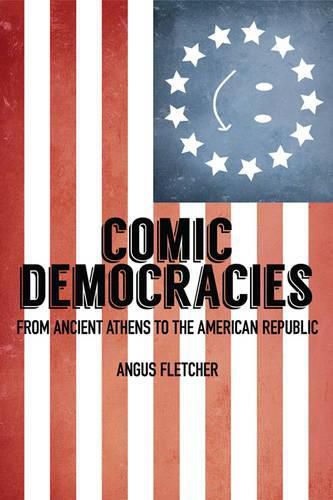Readings Newsletter
Become a Readings Member to make your shopping experience even easier.
Sign in or sign up for free!
You’re not far away from qualifying for FREE standard shipping within Australia
You’ve qualified for FREE standard shipping within Australia
The cart is loading…






For two thousand years, democratic authors treated comedy as a toolkit of rhetorical practices for encouraging problem-solving, pluralism, risk-taking, and other civic behaviors that increased minority participation in government. Over the past two centuries, this pragmatic approach to extending the franchise has gradually been displaced by more idealistic democratic philosophies that focus instead on promoting liberal principles and human rights. But in the wake of the recent democracy recession in the Middle East, the Third World, and the West itself, there has been renewed interest in finding practical sources of popular rule. Comic Democracies joins in the search by exploring the value of the old comic tools for growing democracy today. Drawing on new empirical research from the political and cognitive sciences, Angus Fletcher deftly analyzes the narrative elements of two dozen stage plays, novels, romances, histories, and operas written by such authors as Aristophanes, Menander, Plautus, Ariosto, Machiavelli, Cervantes, Shakespeare, Ben Jonson, William Congreve, John Gay, Henry Fielding, and Washington Irving. He unearths five comic techniques that were used to foster democratic behaviors in antiquity and the Renaissance, then traces the role of these techniques in Tom Paine’s Common Sense, Thomas Jefferson’s preamble to the Declaration of Independence, George Washington’s farewell address, Mercy Otis Warren’s federalist history of the Revolution, Frederick Douglass’s abolitionist orations, and other key documents that played a pivotal role in the development of the early American Republic. After recovering these lost chapters of our democratic past, Comic Democracies concludes with a draft for the future, using the old methods of comedy to envision a modern democracy rooted in the diversity, ingenuity, and power of popular art.
$9.00 standard shipping within Australia
FREE standard shipping within Australia for orders over $100.00
Express & International shipping calculated at checkout
For two thousand years, democratic authors treated comedy as a toolkit of rhetorical practices for encouraging problem-solving, pluralism, risk-taking, and other civic behaviors that increased minority participation in government. Over the past two centuries, this pragmatic approach to extending the franchise has gradually been displaced by more idealistic democratic philosophies that focus instead on promoting liberal principles and human rights. But in the wake of the recent democracy recession in the Middle East, the Third World, and the West itself, there has been renewed interest in finding practical sources of popular rule. Comic Democracies joins in the search by exploring the value of the old comic tools for growing democracy today. Drawing on new empirical research from the political and cognitive sciences, Angus Fletcher deftly analyzes the narrative elements of two dozen stage plays, novels, romances, histories, and operas written by such authors as Aristophanes, Menander, Plautus, Ariosto, Machiavelli, Cervantes, Shakespeare, Ben Jonson, William Congreve, John Gay, Henry Fielding, and Washington Irving. He unearths five comic techniques that were used to foster democratic behaviors in antiquity and the Renaissance, then traces the role of these techniques in Tom Paine’s Common Sense, Thomas Jefferson’s preamble to the Declaration of Independence, George Washington’s farewell address, Mercy Otis Warren’s federalist history of the Revolution, Frederick Douglass’s abolitionist orations, and other key documents that played a pivotal role in the development of the early American Republic. After recovering these lost chapters of our democratic past, Comic Democracies concludes with a draft for the future, using the old methods of comedy to envision a modern democracy rooted in the diversity, ingenuity, and power of popular art.